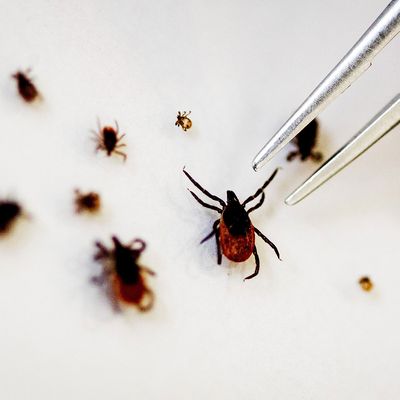
This interview was conducted with the help of a computerized text-to-speech app that allowed Cara to type what she wanted to say, so the app could say it for her.
I am 24 and from New York City. I’ve lived on the Upper East Side my entire life with my two sisters and parents. I went to Scared Heart at first, and then Hotchkiss for a year. I was extremely happy, and had all As (except in science). I was dating the captain of the football team — until he cheated on me when I got sick …
I was on a school trip to China, 15 years old, hiking down Mount Pan with friends. We ended up getting lost because the teacher didn’t accompany us when we veered off the main path and went onto a dirt path. On that hike, I got bit by a tick. Keep in mind, I had no idea what a tick looked like.
At first, the bite looked like a mosquito bite — it was on my left upper arm. It was itchy, then it turned into a giant circular rash that was a bit raised. This happened over the course of two weeks. I also had some stomach issues and a high fever toward the end. I dealt with it privately, mostly. I told my boyfriend that I felt a bit sick, but that it was probably just the food.
On the night of July 4, I went to bed and was never the same again. When I woke up, I was extremely confused. They put me on the phone with my parents. My dad asked, “What’s your name?” I did not know.
My dad got an emergency visa and flew out two days later with my mom. My sister was already in China for another school study-abroad trip, so she was able to get to me quickly. I was in a family hospital, not one that specialized in neurological diseases. Had I been at a different hospital, things might have been better. They thought I might be pregnant. They tested me for HIV. I don’t remember any of this.
When my sister arrived, she approved the MRI and gave them permission to take off my braces, which were then ripped off in the most horrible fashion. They didn’t know if the metal was okay. Suddenly, I got Bell’s Palsy. Then I started having seizures. After two weeks, I was fully paralyzed and could not speak or eat.
Eventually, they did a spinal tap and that’s how they figured out it was encephalitis.
My family flew me back to New York via medevac. The flight attendants stayed in the back because they were so scared of me.
At New York Presbyterian, I was in the ICU. I remember a little. I remember not being able to move my legs or raise my arms. They didn’t know what kind of encephalitis it was until September, two months after the original tick bite.
The doctors fully expected me to deteriorate into full-on vegetable status. But I knew inside that wasn’t going to be my story. I couldn’t move, walk, talk, eat, or express myself at all, but I was thinking coherent thoughts and that in itself was progress.
Then I got transferred to the Rusk Institute at NYU to begin rehabilitation. After a few weeks there, they handed me a computer as an experiment. They didn’t think anything was really working “up there” yet. For me, this was a triumphant moment — I could finally explain that on the inside I was still Cara.
Even though my body wasn’t working — and would never work the same way again — my outlook was positive. Positivity was just my coping mechanism. I was constantly making jokes. Laughing at myself. I never let my brain go to a dark place.
About a month after they said I’d turn into a vegetable, I was “walking” with the help of my dad down the hospital hallway. I was like [jokingly gives the middle finger].
Eating was and is an uphill battle. I was eating through a feeding tube three times a day. That’s like swallowing pool water three times a day. Horrible! Now, food spills out of my mouth when I’m really tired. It’s better than a feeding tube, but still something I’m self-conscious about.
By October of that same year, I was home, but doing outpatient therapy at the hospital. I went back to Sacred Heart to finish high school, then decided on Barnard because I really liked their disability office. I decided to study English because as a child I always loved books.
Handwriting was and still is a struggle. But the biggest struggle is still my speech and coordination. On most days I only use the words “hi,” “hey,” or “yeah.” And even those don’t come out smoothly. This is all because the basal ganglia were affected, which coordinate movement.
I mostly communicate via technology. That’s how I got through college. While other 24-year-olds are going out and partying, I mostly stay home. I wish I could be all, “Hey boys wassssssapppp,” but I can’t right now. Maybe it will happen eventually.
I generally block out any negative experiences, but I will say, some friends have ditched me; shopping isn’t too fun. I hate it when people ask, “Credit or debit?” I hate it.
I still cry when people imitate me speaking. I tell myself, “Stop crying! You look really silly right now.” I remind myself that the encephalitis could have affected my central nervous system, which means it could have affected my breathing and heart rate — it could have gone anywhere and it really only got my speech and coordination for the long term.
Today I’m still getting used to my new normal. It’s extremely challenging not to be able to talk. But — if I can sound cocky for a second — I know I’m beautiful, smart, and funny.
My sister once asked me why I didn’t kill myself when all this happened —and I said only a coward would kill herself. I was born strong and this has only made me stronger.




